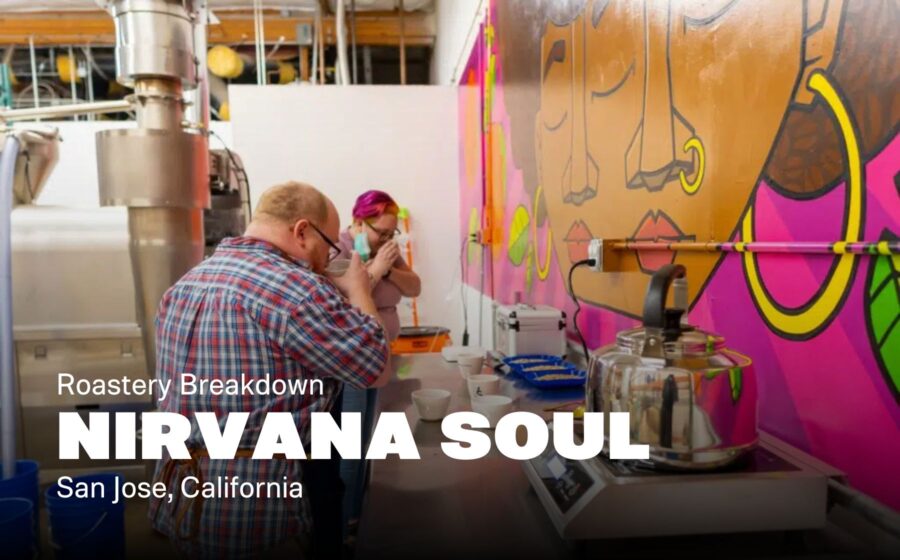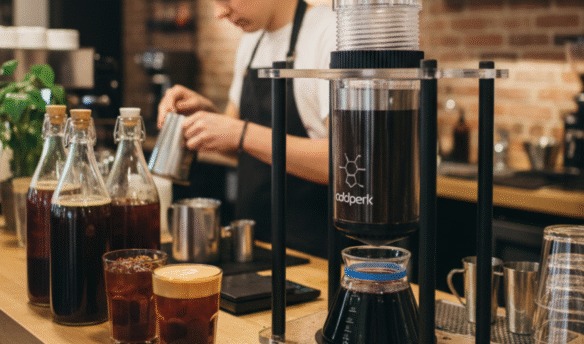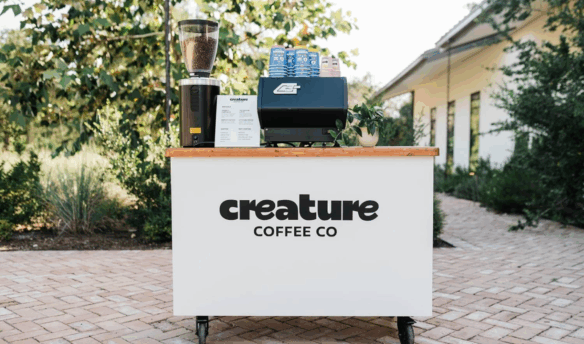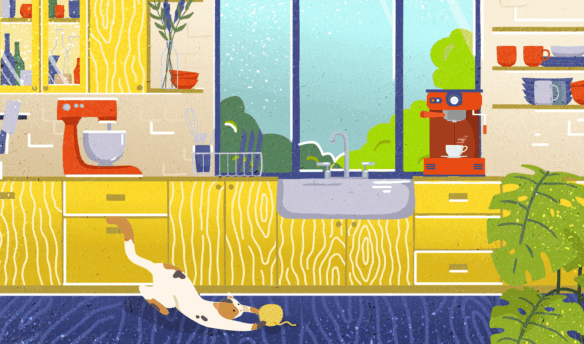The Roastery Breakdown series is presented by our partner, Loring.
Alex Egan had never started a roasting program when they were hired at Nirvana Soul. “When I got there, we had just set up the Loring,” they say, “and it was in this beautiful space with our giant mural in the background with the two sisters on it.”
Beyond the roaster, a Loring S15 Falcon, and the mural, which depicted the founders, sisters Jeronica Macey and Be’Anka Ashaolu, Egan had a lot of decisions to make for the roastery, which would eventually supply coffee to Nirvana Soul’s three locations—two in San Jose, California, one in Cupertino, and another in the works. “We really started from point zero,” they say.
But they had a few cues to work with. Although Egan’s new role as head roaster involved making decisions about the roastery, Macey, Ashaolu, and Nirvana Soul CFO and head of products, Dapo Ashaolu, had already opened a vibrant cafe meant to generate joy and invite community members to enjoy specialty coffee. “Myself, Be’Anka, and Jeronica, we’re from San Jose,” says Ashaolu. “So it was important for us to bring something to San Jose that we felt was missing, which was a fun, colorful, joyful cafe that served specialty coffee.”
That spirit of delight, exuberance, and inclusiveness would come to inform every decision made in building out Nirvana Soul’s roasting space.
Fast Facts
- Roastery Location: Offside in a warehouse in South San Jose, California
- Square Footage: 2700 square feet
- Pounds Roasted: “Between 500-800 pounds a week,” says Egan, “and picking up weekly!”
- Retail and/or Wholesale Roasting: Both
Equipment Alignment
Ashaolu says Nirvana Soul decided to go with a Loring roaster based on what they’d seen previous roasters struggle with. “The space that we’re in was a roastery previously,” says Ashaolu. “I had experienced seeing that roaster in action, and it was smoky and loud and very sensitive to temperature changes and took up a lot of space. I started thinking, ‘What’s important to us?'”
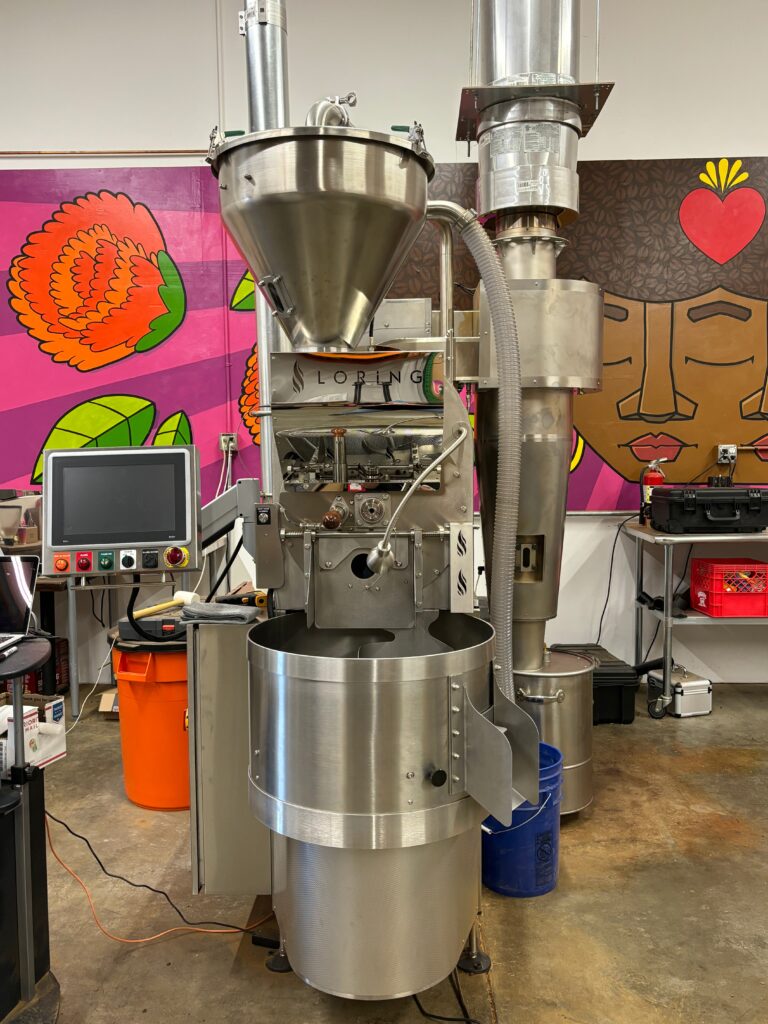
The idea of a quiet machine capable of producing consistent results appealed to Ashaolu. “We really wanted to embrace technology,” he says. “We’ve done that through our cafes—trying to have equipment that makes our barista’s jobs easier and safer for them. We wanted to keep that same energy when we designed the roastery.”
But Ashaolu didn’t expect to end up with a Loring when he did. Initially, Nirvana Soul put their names on a waiting list, anticipating having to wait at least a year before getting a machine and designing a timeline to start their roasting operations based on that. But through a happy series of accidents, Nirvana Soul ended up with a Loring roaster months before they anticipated.
“Things worked out in a miraculous way that someone whose roaster was ready to go had to push back their order a year,” says Ashaolu. “And so Loring said, ‘Okay, if you guys can take this roaster now, it’s yours,’ and we did. So that’s how Alex just jumped into a situation with a roaster already ready to go.”
Flow Through The Space
With a roaster already set, Egan and Ashaolu had to pick all the auxiliary equipment to help set up the roasting operation for success.

- Roasting Familiarity: Egan manages green coffee buying decisions for Nirvana Soul and uses an IKAWA Pro50 to roast samples. The IKAWA also gave Egan something familiar to work with as they navigated learning the ins and outs of the Loring. “I was so intimidated by the Loring when I first came to it,” says Egan, who previously roasted on a Probat. “It was a little intimidating to work with this Cadillac of roasters. I think one of the first purchases we made was our IKAWA sample roaster … it was something I was familiar with.”
- No Carrying Necessary: To move green bags around, Nirvana Soul has a pallet jack—a pink one to match the color and vibrancy of the space. “It’s very rare to have a pink pallet jack,” says Ashaolu.
- Reducing Repetitive Motion: Nirvana Soul stores coffee in bins—the taller, white bins house the green coffee the roasting team uses the most, while the white buckets and the black tubs with yellow lids are for roasted coffee: the team picked wider, shallower buckets for roasted coffee so that during the bagging process, people wouldn’t have to bend over a tall, narrow bucket over and over.
- Wheel-Powered: Not only are the bins more ergonomic to scoop from, but many have wheels, making them easier to move around the space—no one has to carry a bin full of green across the roastery.
- Erase Away: Egan uses erasable labels and Sharpies to label the bins, saving time and reducing waste. “I didn’t even know they made erasable Sharpie labels, but they are so cool,” says Egan. “We’ve had the same ones on our tubs for two years.”
- Lo-Fi Solutions: Not every process needs a fancy piece of equipment. Nirvana Soul packages all retail bags by hand, and they use #2 take-out containers to weigh and scoop coffee into 12-ounce retail bags. “It’s just very ergonomic in that you can squeeze it and hold the coffee in and then stick it into the bag,” says Ashaolu.
- (Not Pictured) Roll It Down: On arrival at the roastery, green coffee travels ergonomically through Nirvana Soul’s space. The roastery has a roll-up door—Ashaolu notes the door was a critical factor in choosing the space—so green coffee can effortlessly be delivered without walking through awkward doors and hallways. “When we receive green,” he says, “it’s easy to get in and out.”

See For Yourself
Recently, Nirvana Soul has opened the doors of its roastery to customers, holding tours of the space for interested patrons. “There’s so many people that are very curious about coffee—they’ve never seen green coffee before. They have no idea what the process is like,” says Ashaolu. “The idea to come and take a tour and see how it’s done, it’s exciting for them.”
Roastery tours foster curiosity and encourage patrons to explore in the cafe, says Ashaolu. “They become more curious, and then they expand and try new things. I think that’s a big part of what we do is wanting to expand coffee education to everyone.”
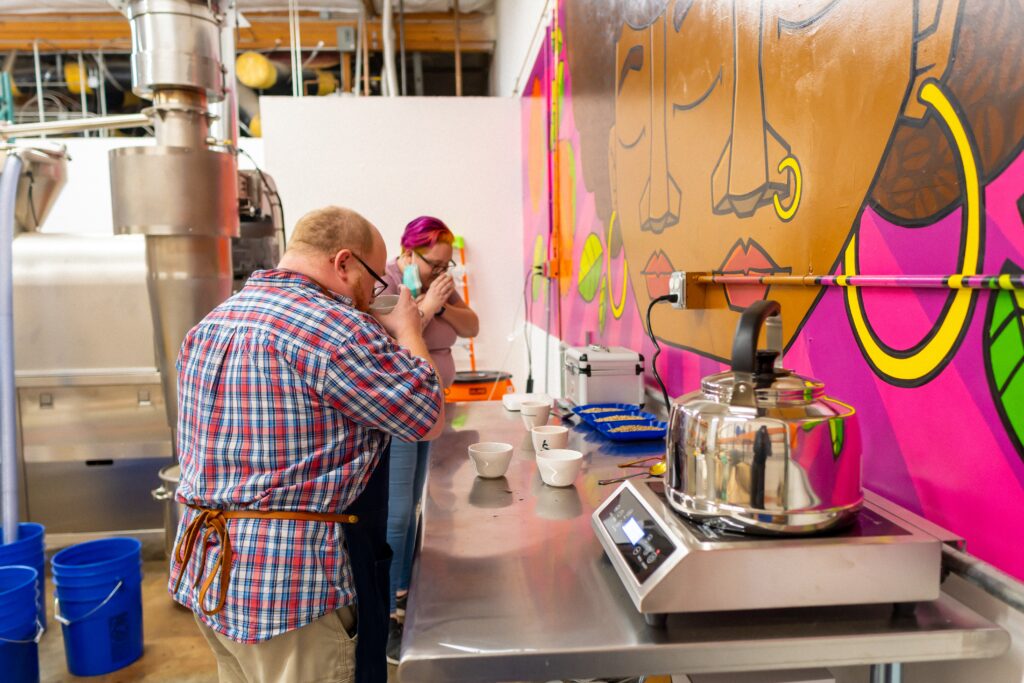
The tours also give insight into what customers want in their coffee. “One of the things we do [during the tour] is a cupping,” says Egan. “So we get to showcase our coffees, but I also get that immediate feedback from customers about, ‘Okay, this is what they like. This is what they don’t like. This is what they want to see.’ All of that information helps me decide what coffees to get.”
Ashaolu says that the brand’s three core principles—”quality coffee, joyful experiences, and [building] an inclusive community”—drive every decision made at Nirvana Soul, and it’s no surprise that these values shape the choices within the roastery. From the moment you look up at the mural to rolling seamlessly through the space, the flow of the roastery is designed to encourage a safe, mindful workplace and be welcoming to all.

